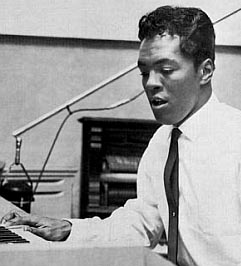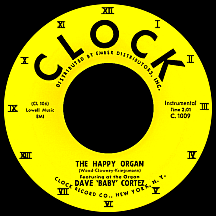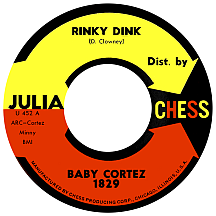DAVE "BABY" CORTEZ
The Happy Organ
At the start any career, a person can never be sure of the exact direction he or she will end up taking. This was the case for David Cortez Clowney of Detroit, Michigan. His interest in playing piano stemmed from his father's expertise with the instrument and a sense of wonder he felt at a Duke Ellington concert he was fortunate enough to witness as a child. Still, the 88 keys weren't the only musical options that beckoned. He had a trumpeter brother and another who drummed and singing was perhaps David's ultimate goal, the allure of center stage a fascinating objective. That's not how it worked out, though; by chance, success came his way as an instrumentalist, but the baby grand was replaced in many instances by a Hammond B3 organ, an electronic update of the original 1930s Hammond that became a favorite of many jazz musicians in the 1950s.
By the time he was 16, in 1954, David had joined The Five Pearls as a pianist and second tenor. Moving to New York City, the group recorded "Please Let Me Know" for Aladdin Records under the auspices of Paul Winley, a songwriter and all-around music mentor who helped get them established. With a slightly different lineup the group made a record for Cat, an Atlantic subsidiary label, as The Sheiks; "Walk That Walk" rocked in contrast to the Five Pearls' ballad, though neither single saw much action outside the area. As a member of The Pearls, there were singles on Atco (Clowney cowrote "Shadows of Love") and Onyx, then he did a one-off piano-bangin' instrumental on Ember, "Movin' and Groovin'" (penned by Winley), credited to The David Clowney Band. It was a direction he didn't plan to follow with any degree of regularity, though he earned much of his income doing session work and recording demos.
Richard Barrett recommended him to The Valentines when a spot in the group opened up. One of New York's smoother vocal doo wop acts, they had recorded for Rama since 1955, but broke up several months into 1957 before David could really settle in. When Barrett began producing The Chantels that summer (as well as Little Anthony and the Imperials the following year), the young protégée became fascinated with what went on behind the scenes. Willing to try different things, he teamed with Bob Kornegey for "Two Old Sparrows" by Dave and Bob, a novelty "break-in" track featuring goofy vocal imitations of Sam Cooke's "You Send Me" and Little Richard's "Good Golly Miss Molly" as well as clips of actual hits including The Champs' "Tequila" and The Monotones' "Book of Love"...for no apparent reason other than to be weird.
Hitless in many attempts under several different names, he waxed another instrumental as Dave Clowney, a cookin' tune on the Paris label called "Hoot Owl" (he penned it with Ken Wood) that featured King Curtis blowing sax in the lead role while Dave essentially provided background key-pounding. Resorting again to a Little Richard-like vocal caricature, he used the name Dave "Baby" Cortez for the first time on Okeh, claiming "You Give Me Heebie Jeebies." Shortly afterwards Wood, who was actually Wally Moody, a former record exec at EMI in Britain, founded the Clock record label, setting up shop in a small office on Broadway and striking a distrib deal with Ember Records. The newly-christened Cortez backed a ballad ("You're the Girl") with a frantic Larry Williams-type tune ("Eeny Meeny Minie Mo"). It went nowhere.
The turning point came when, quite by accident, Dave ditched the vocal approach. A late 1958 session with guitarist Jimmy Spruill doing a "Shortnin' Bread" riff, accompanied by Cortez on piano, got a face-lift of sorts when Dave gave the tune a try on a Hammond B3 that happened to be in the studio. Though he'd never laid his hands on an organ before, the end result (which overdubbed his piano work as well) possessed a fresh spontaneity and a self-explanatory title: "The Happy Organ." Richmond, Virginia's WLLY is credited with breaking the track over the Christmas/New Year holiday. By March of '59 the single began its climb up the national charts, making it to number one, against all odds, in May.

The die was cast. Dropping the Clowney moniker for good, Dave zipped through a seemingly never-ending series of instrumentals, alternating both organ and piano as lead device, making up clever tunes (often with Moody), sometimes based on or incorporating riffs from established songs (and getting away with it!) as a gleeful sort of ongoing game. "The Whistling Organ" lives up to its name and had a respectable run (though far from chart-topping) that summer. The grittier "Piano Shuffle" and feelgood "Cat Nip" stood out during a two-year cycle of keyboard ditties on Clock, then he switched to Mercury for three singles that took him through 1961. Paul Winley issued a few Cortez discs on his own Winley label; by '62 it seemed the keyboard instro gimmick had run its course.
But wait! "Rinky Dink," a catchy little Cortez tune with a signature Mickey Baker guitar riff lifted from Mickey and Sylvia's 1957 hit "Love is Strange," was recorded and released on Julia, a small Elizabeth, New Jersey label. The record developed at radio early in the summer of '62 and Chess Records took over distribution, putting it out on a Julia/Chess 45, oddly identifying the artist as simply Baby Cortez. In September it hit the top ten. This surprise success gave "Baby" a new lease on life, a Chess contract and more charting instrumentals with random titles like "Happy Weekend," "Hot Cakes! 1st Serving" (a "2nd Serving," of course, was offered on the flip) and "Organ Shout," likely named as such for a small group of whoopin', shoutin' bystanders that contributed to the studio session. A previously recorded track, "Fiesta," also found its way onto the charts late in the year. All solid jams and good, clean fun.
When his run with Chess (including a single on Argo) ran its course, Dave had 45s on Okeh ("Popping Popcorn") and Roulette ("Tweetie Pie") in '65, then several more on Roulette including "Count Down," a jazzier '66 offering that was his final chart single of the '60s. After a late-decade break he emerged with a more funky sound, recording for The Isley Brothers' T-Neck Records in '69, followed by smaller label releases as Dave Cortez and the Moon People and Dave Cortez and We The People, wrapping with several disco-leaning mid-'70s discs including a slow-groove vocal, "Someone Has Taken Your Place," that made a landing in the top 50 of the soul charts in June 1973. Two-decades-plus is a strong run for a musician who's too often mistakenly referred to as a one- or two-hit artist; he retired from performing in the early 1980s (a still-young mid-forty-something at the time), though in recent years, Dave "Baby" Cortez has made new recordings and taken to the stage, resuming his rightful place behind that "Happy Organ" keyboard.



